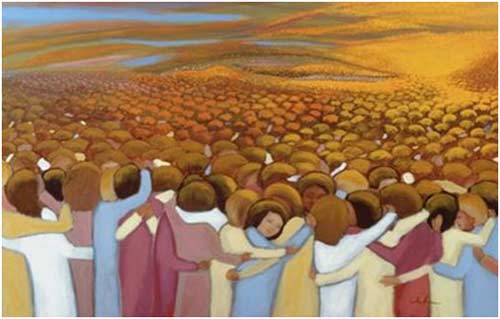Popularly, people say (I’ve said it myself) that the word, “liturgy” (λειτουργία or λῃτουργία) derive from the Greek, “λαός” (Laos – people) and ἔργο (ergo – work) – so that liturgy, we say, means “work of the people”.
But maybe liturgy is not “work of the people” but “work FOR the people”.
Robert Hendrickson wrote about this recently here
The word describes building projects critical to a community’s ongoing life. It might refer to a temple or bridge or the like. The work was done by members of the community but might be sponsored by a wealthy patron.
The work for the people was the work that was done in response to a critical need in the life of the community. These works knit communities together and provided something crucial for them to grow and flourish. It was not about shared ownership but about shared benefit. All liturgy in the Church is a work of shared benefit – but it is not the benefit of grace for which we labor. We labor because it glorifies God. That glorification of God is a work of the people not in that it is a shared production but that it is a crucial piece of our shared infrastructure of faith.
On another site, we are reminded
‘-urgy’ is not a commonly used suffix, but there’s a helpful parallel in the word ‘metallurgy’. This means, not the work of metal, but the working of metal. I think of liturgy as being the working of people – the shaping and forming of them, through regular habits of worship and prayer.
was in ancient Greece a public service established by the city-state whereby its richest members (whether citizens or resident aliens), more or less voluntarily, financed the State with their personal wealth.
Liturgy was public works, usually organised by a private benefactor paying for that. This is something that we (the worshipping community) do for others…
This may turn the way we view liturgy, whom it’s for, who it’s by, why, and what it does, upside down and back to front. Even better – it may not merely change how we view it – it might change how we do it…
This post is the penultimate before a blogging hiatus.




I like to think that church is a co-created place. Everyone works together to produce an atmosphere where God can work. We are not passengers or passive viewers at a performance but actors with a director. The distinction between those at the front and the rest of the congregation is an artificial one.
Those churches which incorporate this vision i their architecture are more likely to attain this goal of shared worship.
Amen! Stephen. Blessings.
“Work of the people” was a term popularised by Massey Shepherd at a time when urgent reform was needed to revitalise the concept of liturgy as a communal effort. As we consider what it means to be a Missional community in a post-Christian context the more literal (as you note) “work for the people” recognises the missional nature of liturgy itself. Our communities need to recognise that what they do on Sunday morning isn’t just inward looking activity. Liturgy as much as – maybe more than – anything else we do is a joining in the missio Dei.
Enjoy the hiatus Bosco. May it be a time of richness and blessing.
I think it may have been you, Brian, who first alerted me to “work for the people” either in a comment here, or in a conversation. Thanks. Blessings.
I’ve tended to prefer “work for” rather than “work of”. It helps restore the emphasis on what God does, rather than on what we do. We gather together not to offer our service to God, but so that God can serve us, through the ministry (administration, service) of the word and sacrament.
Thanks, Anthony. Yes, I think there are a whole lot of shifts in the change of emphasis. Blessings.